13 Unhealthiest Fruit Juices You Can Buy
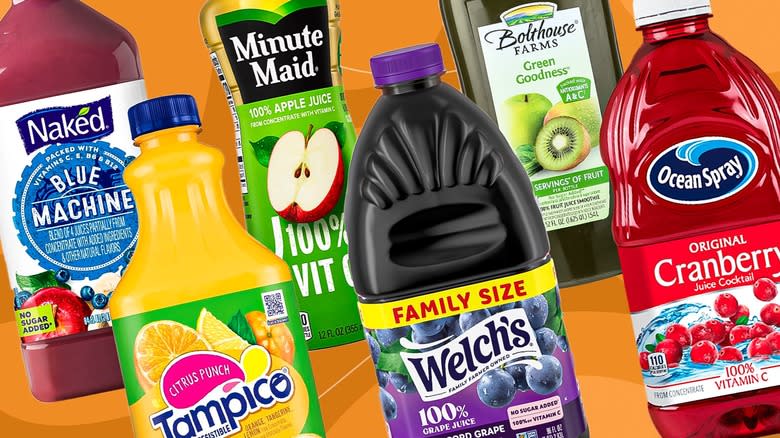
One of the first nutritional facts we learn in life is that fruit is healthy. Logically speaking, you'd think that anything made with one of your five a day is healthy, too -- but that's not always the case. While juices do (usually) contain actual fruit, the juicing process often strips away the fiber that provides nutritional benefit to their whole-fruit counterparts. Instead, many are packed with a dizzying amount of sugar, plus a handful of ingredients that are about as natural as the plastic bottle they come in.
We're not saying you should avoid all juices to live a healthy lifestyle. Some of them do contain enough fruit to constitute a healthy-ish snack. However, before you start chugging several glasses to tick off your five a day, you may want to know more about what you're actually drinking. When it comes to over-the-top sugar, unnecessary additives, and just a general lack of anything worthy of nutritional praise, these 13 juices are some of the worst offenders.
Read more: Diet Sodas, Ranked Worst To Best
1. Welch's Grape Juice
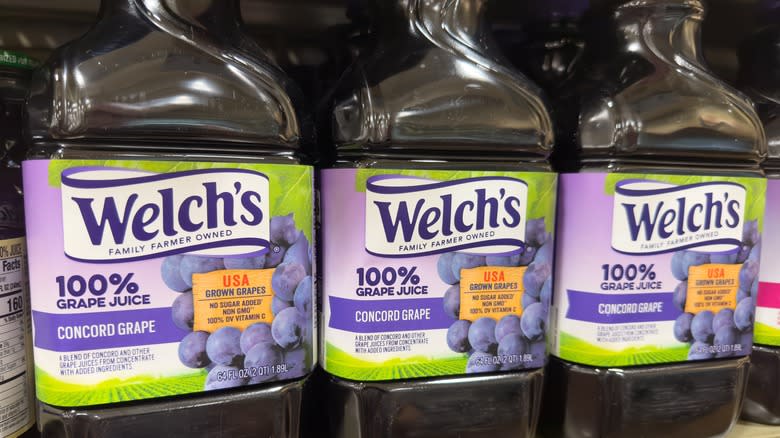
The juice of your childhood does a good job of masquerading as a healthy choice. Welch's Grape Juice bottles proudly proclaim that they're made of 100% Concord grapes, free of added sugars and artificial flavors, and contain 100% of your daily recommended amount of vitamin C. What isn't put in bold writing is the amount of sugar squeezed into each bottle. Every 8-ounce serving of this juice contains 35 grams of sugar -- a few grams more than you'd find in two Reese's Peanut Butter Cups.
So astronomical is this amount of sugar that the Center for Science in the Public Interest once threatened Welch's with a lawsuit if it didn't stop advertising its juices as healthy for your heart (something the brand previously did with heart-health icons on each bottle). While it's true that the polyphenols found in grape juice have been linked to improved cardiovascular function, the CSPI stressed that regularly consuming sugar on this scale could actually contribute to insulin resistance -- negating any possible health benefits. "It's deceptive and misleading for Welch's to claim that grape juice has any special benefit to heart health," said CSPI executive director Michael F. Jacobson at the time. In other words, feel free to pick up Welch's Grape Juice as a refreshing beverage, but don't expect it to make any meaningful contribution to your physical well-being.
2. Bolthouse Farms Green Goodness
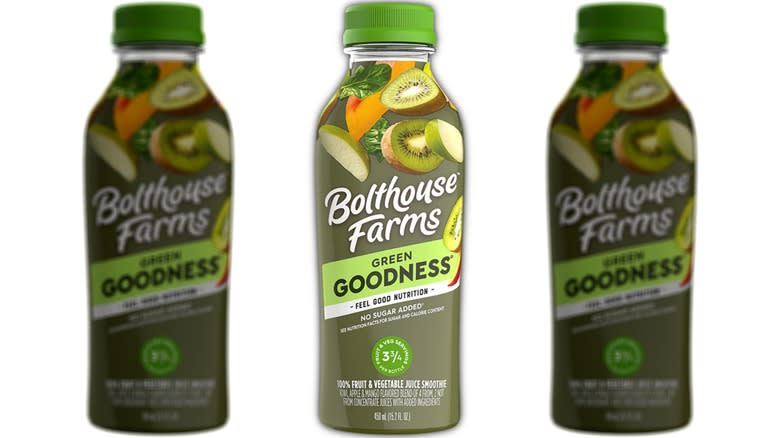
It may not be the most appetizing color, but green foods tend to make extremely valuable additions to your diet. The likes of spinach, broccoli, and kiwi are rich in the vitamins, minerals, and antioxidants we need to thrive -- so, surely anything that features them on its ingredients list is a nutritional diamond?
The answer is no, not exactly. Simply blending these fruits and veggies together would create a healthy snack, but the Bolthouse Green Goodness -- like a lot of green juices -- bulks out the beverage with pineapple and apple juices from concentrate, as well as mango and banana purée. In fact, these sugary substances make up the bulk of the drink, which contains less than 2% dried spinach, broccoli, barley grass, Jerusalem artichoke, and all the other things that would've potentially redeemed it, and places them at the bottom of its ingredients list.
As you'd expect, the result is an extremely sugary drink. Each serving contains a mind-blowing 46 grams of sugar and just 3 grams of fiber. Should these fruits and veggies have actually been consumed raw, this fiber content would've skyrocketed (and left you feeling much more full).
3. Naked Blue Machine Juice
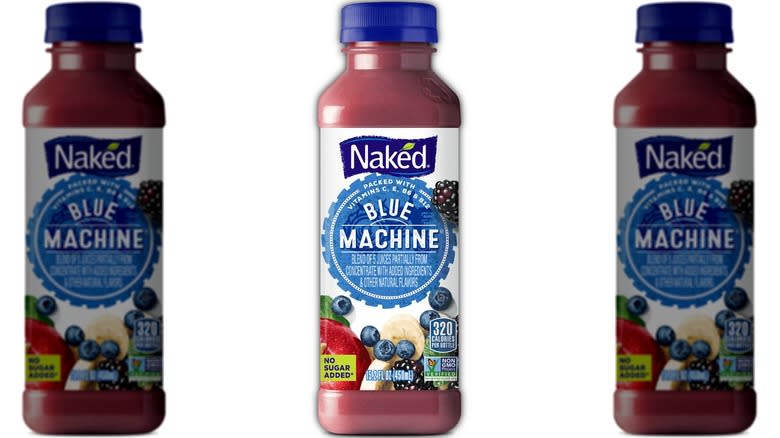
Just like green tends to suggest a food is healthy, we typically associate blue with unhealthy foods. That's true of many candies, sodas, and baked goods that come in lurid shades of cyan, aqua, or turquoise, for these are usually tinted by scary-sounding food colorings. In the case of the Naked Blue Machine Juice, however, its blue name (and decidedly purple hue) comes courtesy of blueberry juice and purée.
Despite its natural origins, there's not much to celebrate here. The combo of blueberries with apple juice from concentrate, banana, and blackberry purée gives each bottle of Naked Blue Machine Juice an absolutely extortionate amount of sugar -- 55 grams per bottle, to be precise. It's also pretty dense in calories, with that same serving packing 320 in total. To give you some perspective, you'll be consuming more sugar and calories than a can of Coca-Cola or an entire Snickers bar. Sure, you'll be getting a tad more vitamin C and a semi-respectable 3 grams of fiber, but even that's not enough to redeem this sugar overload.
4. Dole Apple Juice
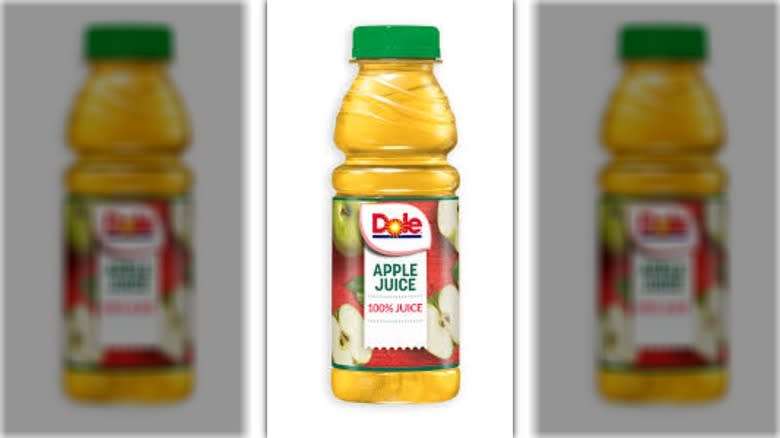
Dole promises a cup of fruit in every serving of its apple juice. That may be true, but it's still hampered by the reality that this is yet another extremely sugary beverage. Downing a serving of Dole Apple Juice will see you consume 210 calories and 48 grams of sugar in a matter of sips.
We can pin the blame for this high sugar content on the fact that this is apple juice from concentrate. When a brand says that a product is made with juice from concentrate, that means that the vast majority of water has been removed, leaving behind a substance that's more akin to syrup and much higher in sugar than regular juice. Brands mostly do this because bacteria won't grow in juice from concentrate as easily, meaning their supplies last longer and they save more money (but the nutritional value of its products ultimately pays the price).
5. Minute Maid Peach Punch
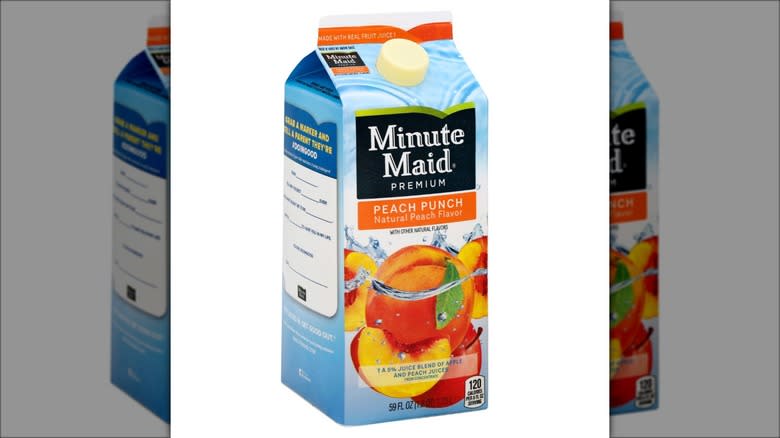
As a general rule, if a juice is described as a "punch," you can mentally file that as "probably unhealthy." These tend to contain a cocktail of different fruit juices plus a bunch of added sugar to sweeten the finished flavor. Minute Maid's fruit punch juices are no exception, with all warranting a spot on this list -- especially its Peach Punch.
Despite the name, you can expect very little actual peach in this juice. The first two ingredients listed are water and high fructose corn syrup, the latter of which has been linked to an increased risk of everything from liver disease to diabetes when consumed in excess. Peach places third and even then it's only a combination of apple and peach juice from concentrate.
With high fructose corn syrup having such a prominent place on the ingredients list, it should come as no surprise that there's a lot of added sugar here. In fact, of the 24 grams of sugar found in every serving, a whopping 23 grams are added sugars -- more than half the amount allocated by FDA guidelines. Tasty though this punch may be, we have enough beef with its nutritional information to recommend keeping it far away from your shopping cart.
6. Naked Mighty Mango Juice
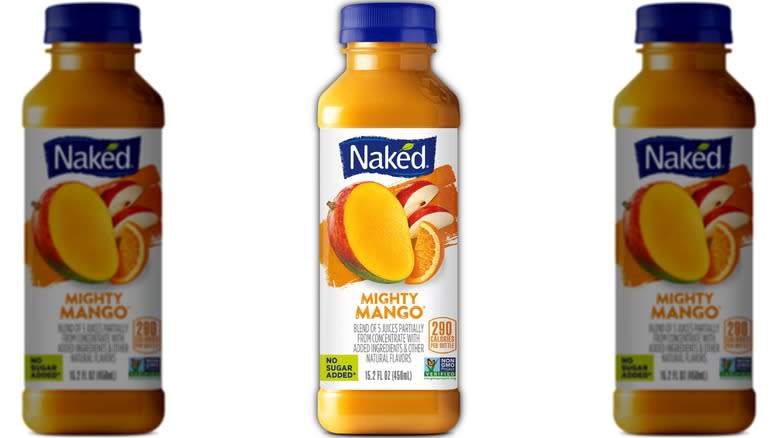
If you thought the 55 grams of sugar in its Blue Machine Juice was something, wait until you hear about Naked Mighty Mango Juice. A blend of mangoes, apples, oranges, bananas, and a splash of lemon, this may make for a tasty tropical treat, but loses some of its allure when you look at the nutritional facts plastered on the back of each bottle.
As well as containing 290 calories, each 15.2-ounce bottle somehow manages to squeeze in 57 grams of sugar. For context, 15.2 fluid ounces is equivalent to about 430 grams, meaning 13% of the entire bottle is just pure sugar. To make matters worse, it contains absolutely no fiber, which would at least help stabilize your blood sugar levels somewhat. Without that, the Naked Mighty Mango Juice is a sugar rush in the making -- most likely to leave you tired and hungry not long after drinking.
7. Welch's Fruit Punch
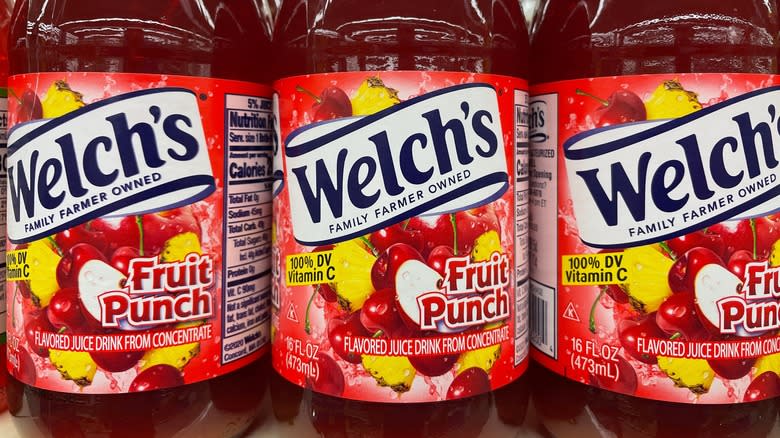
The fruit punch curse strikes again with Welch's Fruit Punch. This drink is a mish-mash of all different kinds of juices from concentrate, including apple, pineapple, and cherry. These are preluded on the ingredients list by filtered water and high fructose corn syrup -- that same fiendish liquid sugar that typically sends added sugar levels (and your blood sugar) soaring.
True to form, the amount of added sugar here is truly astonishing. A single serving of Welch's Fruit Punch contains 44 grams of added sugars -- 88% of the recommended maximum amount you should consume in a day. As if it wasn't sweet enough, it also contains sucralose, an artificial sweetener often sold under the brand name Splenda that's about 600 times sweeter than sugar. While the FDA has declared sucralose safe, a Yale study previously suggested consuming it at the same time as carbohydrates (of which Welch's Fruit Punch contains 49 grams) can negatively impact our metabolism.
8. SunnyD Tangy Original
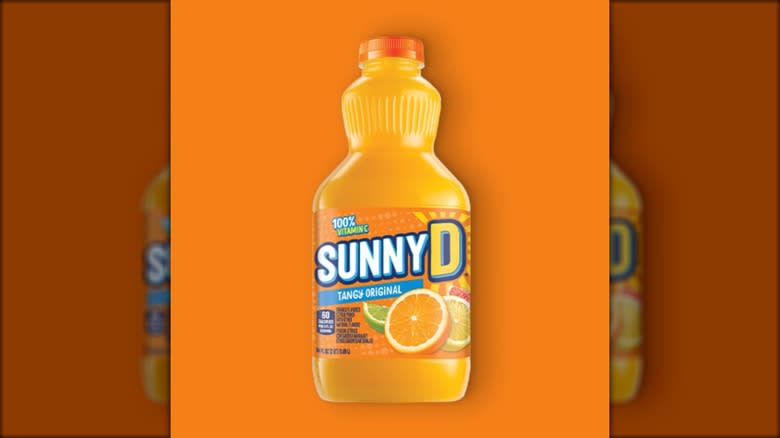
If you know anything about SunnyD's history, it should come as no surprise that it features on this list. Back in 1999 (when SunnyD was still known as Sunny Delight), a four-year-old girl in the U.K. made headlines when her skin turned orange due to the beta-carotene used in the 1.5 liters of SunnyD she was consuming per day. Over two decades later, SunnyD juices no longer contain beta-carotene. However, that doesn't make their ingredient lists any less concerning. SunnyD Tangy Original lists high fructose corn syrup as its second ingredient, and only contains 2% or less of actual orange juice, as well as 12 grams of added sugar per serving.
It also contains yellow 5 and yellow 6, two artificial colors with controversial reputations. Yellow 5, also known as tartrazine, has been linked to hyperactivity, and products including the color are required to include a warning that it "may have an adverse effect on activity and attention in children," (via Healthline). A 2015 study found that yellow 5 may also damage the DNA in our cells (via Anticancer Research Journal), while other studies suggest that yellow 6 may be contaminated with cancer-causing chemicals. All in all, not the strongest resume for SunnyD Tangy Original.
9. Welch's Orange Pineapple Apple Juice Cocktail
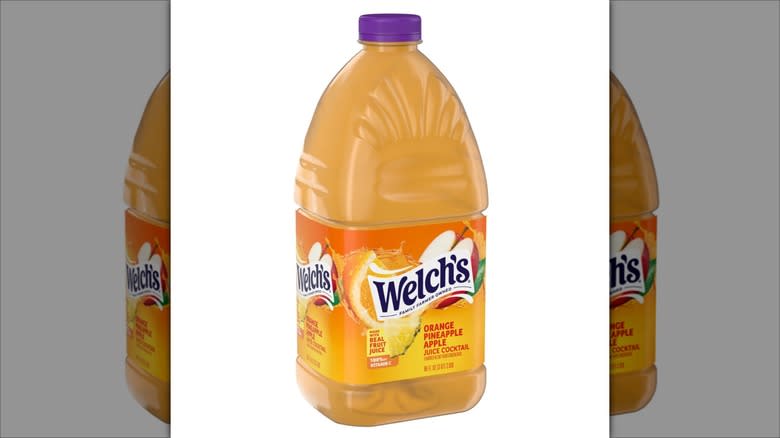
Don't let the name fool you -- a juice cocktail is essentially just a fruit punch. Both contain blends of different juices plus alarmingly high amounts of sugar. Case in point: Welch's Orange Pineapple Apple Juice Cocktail, which combines three different juices from concentrate with our old adversary, high fructose corn syrup.
The sugar content is once again sky-high, with 24 grams in every serving of Welch's Orange Pineapple Apple Juice Cocktail -- 19 grams of which are added sugars (38% of your daily allowance). To add an extra level of sweetness, Welch's throws in stevia leaf extract, a sweetener that's considered safe by the FDA, but may negatively impact gut bacteria. It also contains pectin. This is typically added to juice to make it smoother and isn't unhealthy per se (it may even reduce the risk of heart disease), but can cause stomach upset, including cramps, gas, and diarrhea.
10. Minute Maid Peach Mango
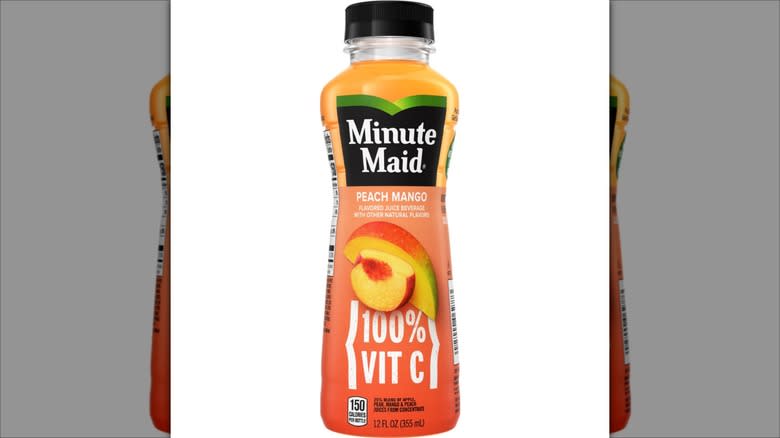
Despite the name, Minute Maid Peach Mango is much more than just peach and mango. While the primary component is water, the rest is bulked out with apple and pear juices, mango purée, and clarified peach juice -- all of which are from concentrate and only make up 25% of the entire beverage. Again, you'll also find high fructose corn syrup, which is disappointingly high on the ingredients list.
Together, these give Minute Maid Peach Mango a total of 37 grams of sugar. A huge amount of this number (28 grams) is made up of added sugars, with each serving eating up 56% of your recommended daily intake with absolutely no dietary fiber to even out the playing field. Sucralose is also used to make this concoction all the more saccharine. If you're craving a sweet drink, the only thing setting it apart from soda is the 81 milligrams of vitamin C in each bottle.
11. Tampico Citrus Punch
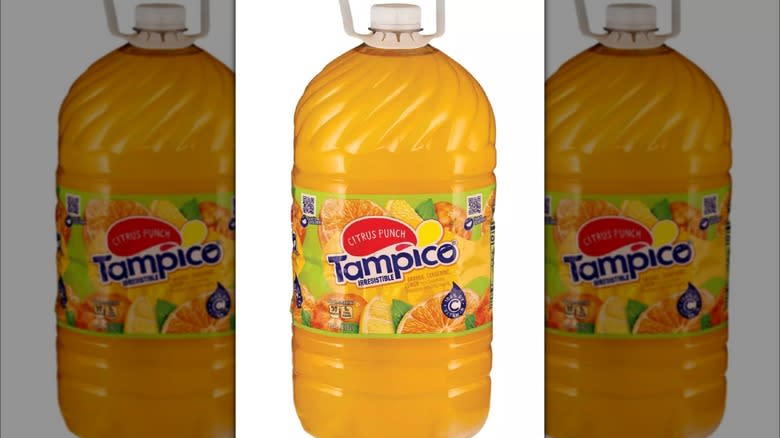
For once, sugar isn't the biggest issue. Tampico Citrus Punch isn't totally devoid of sugar, with 6 grams in each serving, but it's the ingredients that boast the biggest red flags. While the drink brags about its blend of orange, tangerine, and lemon flavors, the key word here is "flavors". It contains very little actual fruit, with less than 2% of each serving made up of fruit juice.
Instead, the Tampico Citrus Punch is primarily just water, high fructose corn syrup, and food colorings (including yellow 5 and yellow 6). The use of two artificial sweeteners, neotame and acesulfame potassium, explains the drink's extreme sweetness and comparatively low sugar content. While neotame has been deemed safe for use, it doesn't have the best reputation. A 2024 study by Anglia Ruskin University found that neotame -- which is also used in cakes, sodas, and chewing gum -- is capable of diseasing healthy gut bacteria and damaging the intestine. Several studies also suggest that acesulfame potassium may have a negative impact on the gut.
12. Ocean Spray Cranberry Juice Cocktail
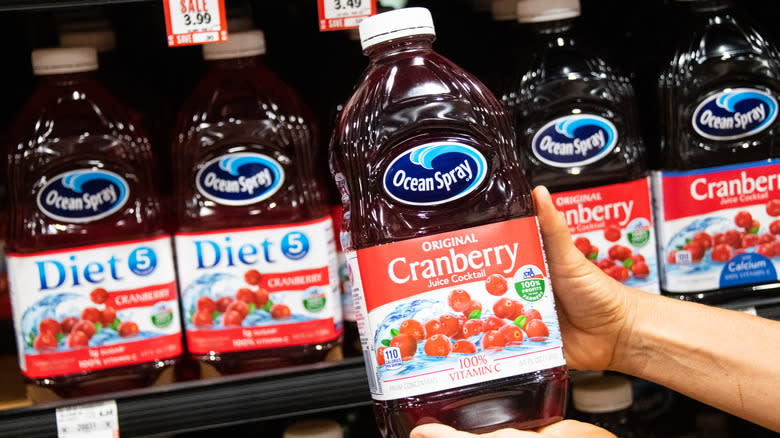
Cranberries are a superfood, rich in antioxidants and vitamin C but famously bitter and tart in their natural state. That's why so many brands load up their cranberry juices with extra sugar and sweeteners. Those that market themselves as a juice cocktail have almost certainly done that to a concerning extent -- as is evident in the nutritional information of the Ocean Spray Cranberry Juice Cocktail.
The ingredients list is relatively short, consisting of just water, cranberry juice concentrate, sugar, ascorbic acid, and vegetable concentrate, the sugar content is much higher than it would be for pure cranberry juice. Each serving contains 25 grams of sugar, the majority of which (23 grams) is added sugar. If you're looking to reap the health benefits of cranberries, you would be better off opting for a beverage with a higher concentration of fruit. It may not satisfy a sweet tooth, but it's a stronger choice health-wise (and will appease your dentist).
13. Minute Maid Apple Juice
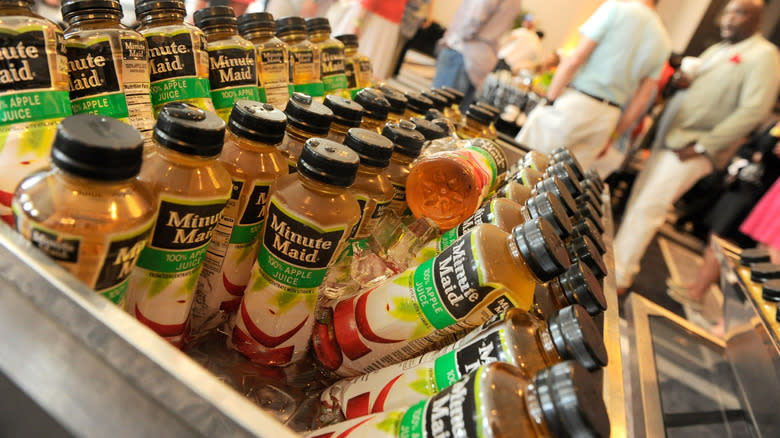
Crisp and refreshing though it may be, Minute Maid Apple Juice was subject to a class action lawsuit in 2023. Plaintiff Mete Karabas filed their case against the Coca-Cola brand for misrepresenting its Apple Juice and fruit punch range as part of a healthy and balanced diet -- despite the fact multiple studies suggest that juices lack the nutritional perks of their whole-fruit counterparts.
It's the sugar that has them most concerned, and for good reason. Each 12 fluid ounce bottle of Minute Maid Apple Juice contains 39 grams of sugar. "The reasonable consumer is unaware that -- or at least the extent to which -- consuming high amounts of free sugar, like that in [Minute Maid juice products], adversely affects digestive health, blood glucose and cholesterol levels; increases inflammation and risk of chronic digestive diseases; and increases risk of metabolic disease, liver disease, heart disease, diabetes and other morbidity," the lawsuit claims (via Top Class Actions).
Methodology
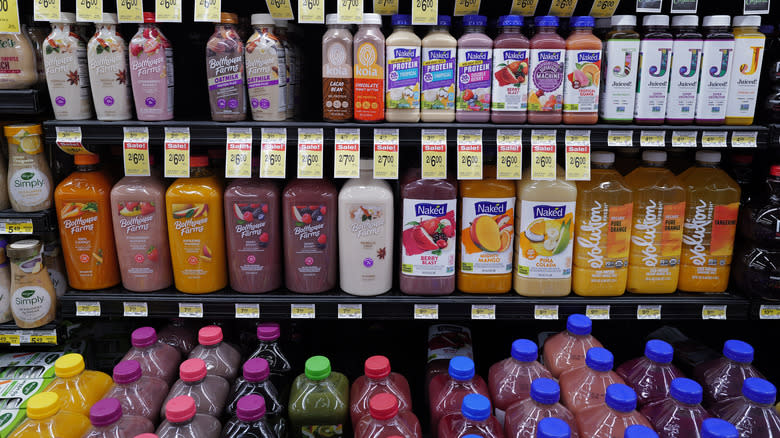
To track down the unhealthiest fruit juices, we pored over the nutritional information for multiple major juice brands. We weren't just looking for those containing a significant amount of sugar (that would have made this list unreasonably long, as this applies to the majority of juices). Instead, we were looking for the juices with an exceptional amount of sugar -- think those that massively eat into your daily recommended sugar allowance as per the FDA. More concerning was if a high percentage of this sugar came from added sugars, such as high fructose corn syrup.
Other ingredients on our red flags list included artificial sweeteners and colors, with the most common culprits being yellow 5 and yellow 6. Other attributes warranting juices a place on this list included a low percentage of actual fruit and the inclusion of only juice from concentrate. And, of course, while calories are not everything, we also kept an eye out for juices that were calorically dense.
Read the original article on Mashed


